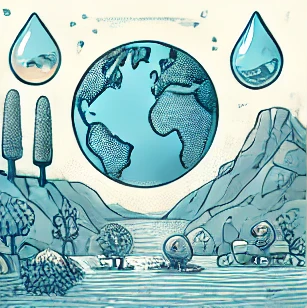Water, the essence of life, has played a critical role in shaping Earth's history, humanity, and ecosystems. From the planet's formation to modern times, its journey reveals a fascinating story of survival, transformation, and utility.


Scientists believe Earth's water originated billions of years ago, during the planet's formation. Some suggest it was delivered by icy comets and asteroids bombarding the early Earth, while others point to volcanic activity releasing water vapor that condensed into oceans. By around 3.8 billion years ago, vast oceans covered the planet, creating a cradle for life.
Water is essential for life, and its presence facilitated the emergence of the first microorganisms in Earth's oceans. These early life forms evolved, using water as a medium for metabolism and reproduction. Over millions of years, aquatic ecosystems flourished, influencing Earth's atmosphere and climate.


Human history is intricately tied to water. Ancient civilizations thrived along rivers: Mesopotamia by the Tigris and Euphrates, Egypt along the Nile, and the Indus Valley by its namesake river. These waterways provided irrigation for agriculture, transportation, and drinking water, fueling human progress. Engineering feats, like aqueducts in ancient Rome and qanats in Persia, showcased humanity's ingenuity in managing water resources. In China, the Grand Canal connected vast regions, boosting trade and communication.
The Industrial Revolution marked a turning point in water use, with rivers powering mills and factories. However, industrialization also introduced pollution, contaminating water sources. In the 20th century, advancements like dams and reservoirs reshaped landscapes, providing electricity and securing water for growing populations. Water management became increasingly critical in modern times, as climate change exacerbated droughts and floods. Innovations in desalination and wastewater recycling offered solutions, but global disparities in access to clean water persist.


Water cycles through Earth's ecosystems, connecting the atmosphere, land, and oceans. It regulates climate, supports biodiversity, and shapes landscapes. Yet human activities—deforestation, pollution, and overuse—threaten this delicate balance, with dire consequences for the planet.
As the global population grows, water scarcity looms as a pressing challenge. International cooperation, sustainable management, and technological innovation are key to ensuring water security for future generations. Conservation efforts and education can help protect this vital resource.
